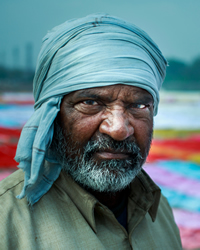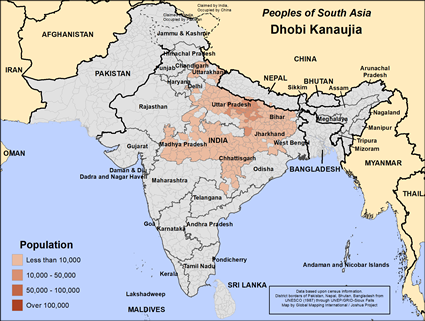Dhobi Kanaujia in India

Photo Source:
Copyrighted © 2026
Lal Nallath - Shutterstock All rights reserved. Used with permission |

Map Source:
People Group data: Omid. Map geography: UNESCO / GMI. Map Design: Joshua Project
|
| People Name: | Dhobi Kanaujia |
| Country: | India |
| 10/40 Window: | Yes |
| Population: | 487,000 |
| World Population: | 488,900 |
| Primary Language: | Hindi |
| Primary Religion: | Hinduism |
| Christian Adherents: | 0.00 % |
| Evangelicals: | 0.00 % |
| Scripture: | Complete Bible |
| Ministry Resources: | Yes |
| Jesus Film: | Yes |
| Audio Recordings: | Yes |
| People Cluster: | South Asia Hindu - other |
| Affinity Bloc: | South Asian Peoples |
| Progress Level: |
|
Introduction
Traditionally, the Dhobi were the ones who washed laundry in the Hindu world, be it India or Nepal. They are one of the lower status communities. One of their subgroups are the Kanaujia. When a Dhobi girl marries, her dowry usually contains just a few items, but almost always an iron. After the men wash the customers' clothes, the women iron them and keep the money they earn to pay for household expenses. Mothers teach the girls to iron at an early age, and boys help their fathers by washing the smaller articles of clothing and by delivering packages of clean clothes to their owners.
Ministry Obstacles
Hinduism reinforces a worldview where there are many paths to truth and spiritual enlightenment. It is very hard for a Hindu to accept the one who claims to be the way, the truth and the life.
Outreach Ideas
Pray for the Followers of Christ
Pray for the Entire People Group
There are all kinds of gospel materials in the Hindi language, spoken by most Kanaujia Dhobis. Pray for them to find and embrace these resources.
Pray that the Dhobi would hear the gospel and discover that only Jesus Christ can wash away their sins.
Pray for workers to go to the Kanaujia Dhobi in India.
Pray that the Holy Spirit would give the Kanaujia Dhobi such spiritual hunger that they will not be satisfied until they taste and see that the Lord is good.
Pray for a movement to Christ among the Kanaujia Dhobi in India and Nepal.